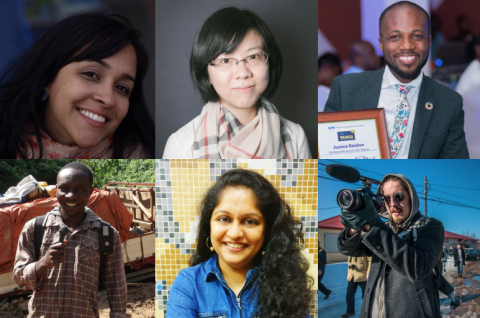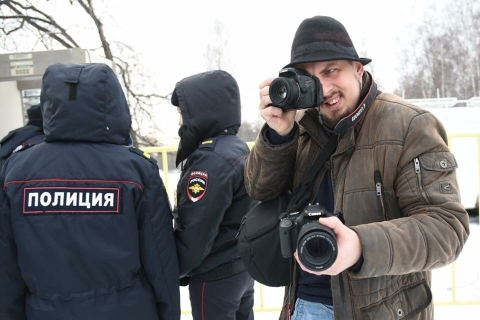
Winners of the 2018 Global Health Reporting Contest shone a light on the resurgence of the deadly Ebola virus in the Democratic Republic of Congo, high infant mortality among India’s poorest populations and scarcity of healthcare in rural China.
The winning entries showcase the best of global health care coverage through powerful storytelling and in-depth reporting on complex medical issues.
“These outstanding health journalists tackled life-threatening health issues--and some exposes have already triggered reforms,” said Joyce Barnathan, president of the International Center for Journalists (ICFJ).
A distinguished panel of judges selected the six winners from more than 150 entries in the program, sponsored by Johnson & Johnson. During a 12-day study tour, the reporters will visit Washington, D.C., Atlanta and New York to meet with medical experts and health journalists. Each winner will receive a $1,000 cash prize.
The Global Health Reporting Contest, in its fifth year, aims to increase the quality and quantity of news coverage on key health issues in targeted regions across the globe. ICFJ will honor the reporters with an awards dinner on December 3 at The New York Times.
Brazil: In “Nine Months of Mourning,” freelance journalist Joana Suarez documented the suffering of women forced to carry babies to full term even when the fetuses have damaged vital organs or other abnormalities and cannot survive. She reported that Brazil’s abortion laws are strict and offer little relief.
Suarez’s in-depth report was cross-published on 14 websites, drew comments on journalism blogs and received thousands of hits on social media networks. One reader praised Suarez for her sensitivity and noted, “I cried tears all the way through the story.”
“The hardest part was gaining the confidence of women who were going through this enormous suffering,” said Suarez, who specializes in investigative reporting on human rights, healthcare and feminist issues. “It was not easy to listen to their stories without getting upset and emotional myself. [The challenge] was to put everything in context, with care, affection and understanding of the Brazilian reality in relation to abortion.”
China: In “Severely Ill Children Fall through the Cracks of China’s Health Care System,” Cai Yiwen took readers on a family’s journey to save the life of their 14-year-old daughter, Yingying, who suffered from a rare bone marrow disease. The piece highlighted the glaring gap between medical care in China’s impoverished rural areas and wealthier urban centers.
“It was heartbreaking to listen to parents talk about having to choose between the death of a child or destitution,” said Cai, a health and education reporter for Shanghai-based Sixth Tone who traveled to Inner Mongolia for her story. “Many rural families delay treatment, or even give their children up for dead, because they can’t afford medical fees.”
Cai also profiles the nonprofit China Rural Kids Care (CRKC) that funds additional health insurance for rural children with critical illnesses. “Without CRKC, Yingying would not be alive today,” her mother said.
Congo: In his documentary, “Ebola, a Political Issue in DRC,” Merveille Kakule Saliboko explored how a resurgence of the deadly Ebola virus had become a battleground issue in the upcoming elections in the Democratic Republic of Congo.
“Ebola is such a controversial subject,” said Saliboko, a multimedia journalist based in Butembo and guest blogger for MO magazine. “It had become a source of tension locally. I was hearing rumors from the left and the right, going in every direction. People needed accurate information.”
His touching story featured a grieving family that had lost a loved one to the virus. As part of his reporting, he analyzed the rumors, categorized them, pinpointed areas of greatest controversy and conducted interviews. After the story ran, “Many Congolese people copied and pasted my text and shared it on WhatsApp and other social networks,” Saliboko said.

Ghana: In his documentary, “Shortage of Plumpy'Nut,” multimedia journalist Justice Baidoo painted a grim picture of how a lack of a nutritional supplement could be a death sentence for malnourished children in Ghana’s northern region.
A day after the story aired, the United Nations International Children’s Emergency Fund (UNICEF) airlifted 4,000 boxes of Plumpy'Nut to areas most affected by the shortage, and pledged to continue the supplies. Ghana’s Ministry of Health struck a deal with a local producer of Plumpy'Nut to make the food supplement readily available year-round.
“The story on the shortage of Plumpy'Nut started a huge national conversation within minutes of airing,” said Baidoo, who produces documentaries for Multimedia Group, Ghana’s largest media conglomerate.
Other stories in his winning entry include “Leaking Wounds” and “Vaccines Saving Lives of Children in Northern Ghana.”
India: Disha Shetty put a human face on the issue of infant mortality in India, reporting that the country leads the world in first-day infant deaths. She told the story of a family in a remote mountain village who lost two babies due to complications related to malnutrition and poor health care. She interviewed dozens of additional sources and conducted extensive research.
“The biggest challenge was to ensure the narrative was engaging and that I got the science right,” said Shetty, a science journalist based in Bengaluru.
After the story ran, she received a “deluge” of comments praising her research and expressing hope the findings would be an “eye opener” to doctors and policy makers.
Stories in her winning entry were: “India’s Public-Health Failures That PM’s Insurance Scheme Won’t Plug: The Story of Arti and Kailash,” “Where Doctors Won’t Go, Pregnant Women are Deserted” and “Mothers in Distress: How Forced C-Sections Are Depriving Parents of Their Choice in Birth.”

Russia: In “Alone with Loneliness,” Sergei Markelov sought to “give people who were suffering from complicated psychiatric disorders an opportunity to speak about themselves and be heard.”
A local psychiatrist introduced Markelov to patients willing to discuss their psychiatric disorders and medical treatment, including electroconvulsive therapy. One man described how “They would attach two wires here, to the brain. I had it five times. I wonder why my brain didn’t explode.”
The story received 11,000 hits on Vkontakte, a Russian online social networking service. The highly emotional encounters took a toll on Markelov, who works in the remote Russian Republic of Karelia, freelancing for 7 X 7, Horizontal Russia - an interregional media outlet that spotlights human rights, environmental concerns and corruption and works “where no one else does.”
“These were very hard interviews, mostly about personal struggles to survive--the loneliness, suffering and experiences with treatment,” he said. “It took me a day to recover after every interview.”